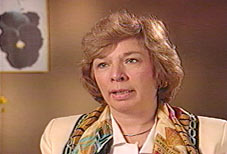 |
|
|
Videos
PO Box 2480Nevada City, CA 95959
Phone/Fax: 800-345-5530
(530-477-0701 outside US and Canada)
Email: info@cavalcadeproductions.com
 A Video Series on Dissociative Disorder:
A Video Series on Dissociative Disorder:
Treating the Dissociative Client
Since dissociative disorders were rediscovered in the 1970s, enormous progress has been made in understanding how best to treat these trauma-based problems. This video series is based on the sequenced model for treating a dissociative disorder, in which the first phase is devoted to stabilization, safety, and symptom reduction, the second phase focuses on the trauma itself, and the final phase deals with resolution, reconsolidation, and reconnection. Released 1997. Treating the Dissociative Client I: Stabilization Treating the Dissociative Client II: Trauma Work Purchase price: One VHS/DVD $150, both $250 Customers who bought this video series also bought: About the Presenters Peter M. Barach, PhD is a psychologist in private practice in Cleveland, Ohio. He is the author of several papers and book chapters on dissociative identity disorder. Dr. Barach chaired the Standards of Practice Committee for the International Society for the Study of Dissociation, and was a co-author of ISSD’s treatment guidelines for DID. James A. Chu, MD, is Director of the Trauma and Dissociative Disorders Program, McLean Hospital, and Assistant Professor of Psychiatry, Harvard Medical School. His publications include both basic research on the effects of child abuse and discussions of treatment techniques for abuse survivors. Dr. Chu is a Fellow of the American Psychiatric Association, and a Fellow and Past President of ISSD. Christine A. Courtois, PhD is a psychologist in private practice in Washington, DC and Clinical Director, THE CENTER: Post-traumatic Disorders Program, the Psychiatric Institute of Washington. She conducts workshops internationally on treating incest and sexual assault, and is author of Healing the Incest Wound: Adult Survivors in Therapy. Richard P. Kluft, MD, PhD practices psychiatry in Philadelphia. He is Clinical Professor of Psychiatry at Temple University School of Medicine, and Visiting Lecturer at Harvard Medical School. He is author of over 225 scientific articles and book chapters, and is Editor-in-Chief of the journal Dissociation. Bessel A. van der Kolk, MD, is Director of the HRI Trauma Center, which specializes in the study and treatment of children and adults with histories of severe psychological trauma. He is Professor of Psychiatry at Boston University and past president of the International Society for Traumatic Stress Studies. His most recent book is Traumatic Stress: The Effect of Overwhelming Experiences on Mind, Body and Society. The Trainer’s Guide The 38-page trainer’s guide includes objectives, reproducible outlines for note-taking, review and discussion questions, a resource list, a summary paper, and a journal article, described below. Christine Courtois' paper, "Guidelines for the Treatment of Adults Abused or Possibly Abused as Children," is summarized as follows: Treatment of abuse-related psychological effects follows the established principles of practice for generic psychotherapy; yet, specialized knowledge and skills are required to address the complex issues that often are involved. These guidelines outline general principles for post-trauma treatment of abuse along with cautions and recommendations for working with delayed/recovered memories when they emerge during the course of treatment. This document is not intended to be overly prescriptive nor does it constitute a formal standard of care; rather, it summarizes the present consensus among experts in post-abuse and post-trauma treatment regarding ethical and competent practice and takes into consideration critiques and suggestions offered by memory researchers. Furthermore, these guidelines can be modified as needed for different mental health disciplines, theoretical orientations, and cultural considerations. The trainer’s guide also includes James Chu’s article, "The Rational Treatment of Multiple Personality Disorder", which is abstracted as follows: The complex symptomatology of patients who have survived profound childhood abuse, particularly the severe dissociative and post-traumatic symptoms of patients with multiple personality disorder (MPD), may predispose therapists to engage in poorly considered psychotherapeutic practices. Therapists should be careful to keep a rational clinical perspective, and not to be distracted by patients’ unusual and dramatic clinical presentation. This article discusses the particular problematic areas often encountered in the treatment of MPD patients, including the necessity for pacing the therapy, keeping the focus on the patient as a whole, and avoiding preoccupation with individual personalities or with MPD phenomenology. Good clinical judgment and sound therapeutic principles should be the core of the psychotherapy of MPD. |
